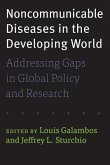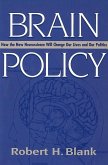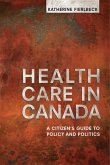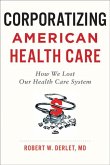Health Politics and Policy
Herausgeber: Tolleson-Rinehart, Sue; Peterson, Mark A
Health Politics and Policy
Herausgeber: Tolleson-Rinehart, Sue; Peterson, Mark A
- Broschiertes Buch
- Merkliste
- Auf die Merkliste
- Bewerten Bewerten
- Teilen
- Produkt teilen
- Produkterinnerung
- Produkterinnerung
The last half of the 20th century witnessed explosive growth in science and technology in the developed world, including extraordinary developments in medicine. As medicine's capacity and complexity has grown, so has the popular sense that health care is a right and that the political system should deliver the care. Today, political systems grapple with every imaginable facet of health and health care, from educating and regulating the health workforce to creating systems to pay for the cost of care; from setting and funding the biomedical research agenda to determining who gets what care,…mehr
Andere Kunden interessierten sich auch für
![Africa and Global Health Governance Africa and Global Health Governance]() Amy S PattersonAfrica and Global Health Governance43,99 €
Amy S PattersonAfrica and Global Health Governance43,99 €![150 Years of Obamacare 150 Years of Obamacare]() Daniel E Dawes150 Years of Obamacare22,99 €
Daniel E Dawes150 Years of Obamacare22,99 €![Rethinking Health Care Policy Rethinking Health Care Policy]() Robert B HackeyRethinking Health Care Policy45,99 €
Robert B HackeyRethinking Health Care Policy45,99 €![Noncommunicable Diseases in the Developing World Noncommunicable Diseases in the Developing World]() Noncommunicable Diseases in the Developing World40,99 €
Noncommunicable Diseases in the Developing World40,99 €![Brain Policy Brain Policy]() Robert H BlankBrain Policy45,99 €
Robert H BlankBrain Policy45,99 €![Health Care in Canada Health Care in Canada]() Katherine FierlbeckHealth Care in Canada55,99 €
Katherine FierlbeckHealth Care in Canada55,99 €![Corporatizing American Health Care Corporatizing American Health Care]() Robert W DerletCorporatizing American Health Care33,99 €
Robert W DerletCorporatizing American Health Care33,99 €-
-
-
The last half of the 20th century witnessed explosive growth in science and technology in the developed world, including extraordinary developments in medicine. As medicine's capacity and complexity has grown, so has the popular sense that health care is a right and that the political system should deliver the care. Today, political systems grapple with every imaginable facet of health and health care, from educating and regulating the health workforce to creating systems to pay for the cost of care; from setting and funding the biomedical research agenda to determining who gets what care, when; from clinical preventive services to broader agendas for promoting population health. Although many of these questions seem economic in nature, they are inescapably political questions regarding the authoritative allocation of resources in response to the contention of values and ideas. This major reference collection shines a bright light on health politics. The editors have organized and introduced some of the best of the canon of health politics literature in four volumes covering political analysis of the emergence and shape of health systems, public perceptions of government's responsibility to assure the delivery of care, health care in a comparative perspective, and the politics of health reform. Volume One: Defining Health Systems - Path Dependence and Policy Emergence contains articles that emphasize critical perspectives on the development of given health system structures, with particular attention to the choices, and the paths that led to those choices, in favour of systems driven by private sectors (such as that of the United States) and systems that are more explicitly public (such as the European systems). Volume Two: Tensions in Health Policy - Ethics, Interests, and the Public treats health and health care broadly, including considerations of questions about the meaning of assertions to a "right" to health, the role of prevention in individual and public health, and contentious health care questions such as those surrounding stem cell research and reproductive rights. Volume Three: Health Systems in Comparative Perspective includes articles that illustrate global differences in the politics and policy of health care. Volume Four: the Contemporary Politics of Health System Reform examines the politics of health reform, including articles that address reform proposals as the sources of political conflict they inevitably are.
Hinweis: Dieser Artikel kann nur an eine deutsche Lieferadresse ausgeliefert werden.
Hinweis: Dieser Artikel kann nur an eine deutsche Lieferadresse ausgeliefert werden.
Produktdetails
- Produktdetails
- Verlag: Sage Publications
- Four-Volume Set edition
- Seitenzahl: 1528
- Erscheinungstermin: 9. Februar 2011
- Englisch
- Gewicht: 2977g
- ISBN-13: 9781849205023
- ISBN-10: 1849205027
- Artikelnr.: 32912133
- Herstellerkennzeichnung
- Libri GmbH
- Europaallee 1
- 36244 Bad Hersfeld
- gpsr@libri.de
- Verlag: Sage Publications
- Four-Volume Set edition
- Seitenzahl: 1528
- Erscheinungstermin: 9. Februar 2011
- Englisch
- Gewicht: 2977g
- ISBN-13: 9781849205023
- ISBN-10: 1849205027
- Artikelnr.: 32912133
- Herstellerkennzeichnung
- Libri GmbH
- Europaallee 1
- 36244 Bad Hersfeld
- gpsr@libri.de
Sue Tolleson-Rinehart, PhD is the Assistant Chair for Faculty Development in the Department of Pediatrics in School of Medicine at the University of North Carolina at Chapel Hill and the Co-Associate Director of the MD-Master of Public Health joint degree program of the UNC Gillings School of Global Public Health and the UNC School of Medicine. She is an adjunct member of the UNC Political Science Department. A political scientist who built a national reputation in gender politics scholarship before adding health politics and policy to her teaching and research interests, she has authored, co-authored, or edited three books and numerous articles in gender politics, including publications on the politics and policy of women′s health. She has been the co-Principal Investigator of the UNC Center for Education and Research on Therapeutics funded by the U.S. Agency for Health Care Policy Research, and the Principal Investigator of PEDS: Pediatric Education for Drug Safety, a grant awarded by the Attorneys General Prescriber and Consumer Education Program. In 2008, she was elected a Fellow of the UNC School of Medicine Academy of Educators. She led the effort to create the Organized Section in Health Politics and Policy of the American Political Science Association (APSA), the first time the field of health politics has had an official research section within the Association. She was the Section′s first Program Chair at the 2009 APSA Annual Meeting, and has recently concluded a term as Section President. Mark A. Peterson is Professor of Political Science and Public Policy, and former Chair of the Department of Public Policy at the School of Public Affairs, University of California, Los Angeles. At UCLA he is a Faculty Associate of the Center for Health Policy Research and the Center for Society & Genetics;, Co-Director of the Policy Core for the Center for HIV Identification, Prevention, and Treatment Services;, and on the faculty boards of the Center for American Politics and Public Policy. From 1993 to 2002, he was the Editor of the Journal of Health Politics, Policy and Law. He chairs the National Advisory Committee for the Robert Wood Johnson Foundation (RWJF) Scholars in Health Policy Research Program and serves on the national advisory committees for three additional RWJF programs. His scholarship focuses on interactions among the Presidency, Congress, and interest groups, evaluating their implications for policy making, both within the general domain of domestic policy and with special attention to health care policy. He was elected to membership in the National Academy of Social Insurance, the Council of the American Political Science Association, and as President of the Association′s Public Policy Section.
VOLUME 1: DEFINING HEALTH SYSTEMS - PATH DEPENDENCE AND POLICY EMERGENCE Path dependence and system determinants Ideology, Medical Technology, and Health Care Organization in Modern Nations - David Mechanic Institutions, Veto Points, and Policy Results: A comparative analysis of health care - Ellen Immergut The Historical Logic of National Health Insurance: Structure and sequence in the development of British, Canadian, and U.S. medical policy - Jacob Hacker Nothing Succeeds Like the Right Kind of Failure: Postwar national health insurance in Canada and the United States - Antonia Maioni Maternal Health Care Policy: Britain and the United States - Sue Tolleson-Rinehart Tracing the evolution of health policy processes Understanding Social Insurance: Fairness, affordability, and the
modernization
of Social Security and Medicare - Theodore Marmor and Jerry Mashaw The Political Economy of Medicare - Bruce Vladeck A Political History of Medicare and Prescription Drug Coverage - Thomas Oliver, Philip Lee and Helene Lipton The Lessons of Success: Revisiting the Medicare story - David Blumenthal and James Morone Regulating health policy Protection without Capture: Product approval by a politically responsive, learning regulator - Daniel Carpenter State Legislative Staff Influence in Health Policy Making - Carol Weisert and William Weissert Litigation and Public Health Policy Making: The case of tobacco control - Peter Jacobson and Kenneth Warner Policy experimentation States as Policy Laboratories: Emulating success in the Children
s Health Insurance Program - Craig Volden The Curious Conversion of Empire Blue Cross - James Robinson VOLUME 2: TENSIONS IN HEALTH POLICY: ETHICS, INTERESTS, AND THE PUBLIC Ethics, Justice, Governance, Rights, and Health Care The Struggle for the Soul of Health Insurance - Deborah Stone Enemies of the People: The moral dimension of public health - James Morone Health as Citizenship Narrative - Candace Johnson Civil Wars Kill and Maim People Long After the Shooting Stops - Hazem Adam Ghobarah, Paul Huth and Bruce Russett AIDS and the American Health Polity: The history and prospects of a crisis of authority - Daniel Fox Equity and Population Health: Toward a broader bioethics agenda - Norman Daniels Health, Equity, and Reproductive Risks in the Workplace - Cynthia Daniels, Maureen Paul and Robert Rosofsky Preserving Community in Health Care - Ezekiel Emanuel and Linda Emanuel Public Opinion, Electoral Conflict, and the Representation of Interests Political Preference Formation: Competition, deliberation, and the (ir)relevance of framing effects - Jamie Druckman Does Policy Debate Reduce Information Effects in Public Opinion?: Analyzing the evolution of public opinion on health care - Ryan Claassen and Benjamin Highton The Importance of Social and Political Context: The case of AIDS activism - M. Kent Jennings and Ellen Ann Andersen "Culture of Life" Politics at the Bedside: The case of Terri Schiavo - George Annas The Translation of Interests into Policy Brokering Health Policy: Coalitions, Parties, and Interest Group Influence - Michael Heaney Buying Expertise: Campaign contributions and attention to policy analysis in Congressional committees - Kevin Esterling Reconsidering the Counter-Mobilization Hypothesis: Health policy lobbying in the American States - David Lowery, Virginia Gray, Jennifer Wolak, Erik Godwin and Whitt Kilburn The Politics of Obesity: A current assessment and look ahead - Rogan Kersh The Meaning and Measure of Policy Metaphors - Schlesinger Mark and Lau Richard VOLUME 3: HEALTH SYSTEMS IN COMPARATIVE PERSPECTIVE Health policy, divergence, and convergence in systems The Challenge of Comparative Health Policy for Political Science - David Falcone Setting Health Priorities across Nations: More convergence than divergence? - Blank Robert and Viola Burau Five Metaphors about Global-Health Policy - David Stuckler and Martin McKee Exceptionalism is the Rule?: U.S. health policy innovation and cross-national learning - Lawrence Brown Health Policy and the Political Marketplace How Does Private Finance Affect Public Health Care Systems?: Marshaling the evidence from OECD nations - Carolyn Hughes Tuohy, Colleen Flood and Mark Stabile Market Failure and the Failure of Discourse: Facing up to the power of sellers - Bruce Vladeck and Thomas Rice Health Equity in Transition from Planned to Market Economy in China - Jun Gao, Juncheng Qian, Shenglan Tang, Bo Eriksson and Erik Blas The Enactment of National Health Insurance: A Boolean analysis of twenty advanced industrial countries - Charles Blake and Jessica Adolino Change and adaptation The Politics of Modernization: Britain
s National Health Service in the 1980s - Patricia Day and Rudolf Klein Universal Health Care: Lessons from the British experience - Donald Light Has Solidarity Survived?: A comparative analysis of the effect of social health insurance reform in four European countries - Hans Maarse and Aggie Paulus An Experiment with Regulated Competition and Individual Mandates for Universal Health Care: The new Dutch health insurance system - Pauline Rosenau and Christiaan Lako Political culture and variance in health policy Political Cultures, Health Systems and Health Policy - Sara Atkinson Effect of Democracy on Health: Ecological study - Álvaro Franco, Carlos Álvarez-Dardet and Maria Teresa Ruiz Generating Political Priority for Maternal Mortality Reduction in 5 Developing Countries - Jeremy Shiffman Proximal, Distal, and the Politics of Causation: What
s level got to do with it? - Nancy Krieger VOLUME FOUR: THE CONTEMPORARY POLITICS OF HEALTH SYSTEM REFORM System imperatives as brakes to or catalysts of change Political Influence in the 1990s: From iron triangles to policy networks - Mark Peterson Nature or Nurture?: Sources of firm preference for national health reform - Cathie Jo Martin Health Reform Impasse: The politics of American ambivalence toward government - Lawrence Jacobs Locationg the Issue Public: The multi-dimensional nature of engagement with health care reform - Vincent Price, Clarrissa David, Brian Goldthorps, Marci McCoy Roth and Joseph Capella Translating Ideas into Actions: Entrepreneurial leadership in state health care reforms - Thomas Oliver and Pamela Paul-Shaheen Health Reform Interrupted: The unraveling of the Oregon Health Plan - Jonathan Oberlander Social Movements as Catalysts for Policy Change: The case of smoking and guns - Constance Nathanson Determining the public good Between Welfare Medicine and Mainstream Entitlement: Medicaid at a political crossroads - Colleen Grogan and Erik Patashnik Uses and Abuses of Long-Term Medicare Cost Estimates - Joseph White Leading the Health Policy Orchestra: The need for an intergovernmental partnership - Michael Sparer
modernization
of Social Security and Medicare - Theodore Marmor and Jerry Mashaw The Political Economy of Medicare - Bruce Vladeck A Political History of Medicare and Prescription Drug Coverage - Thomas Oliver, Philip Lee and Helene Lipton The Lessons of Success: Revisiting the Medicare story - David Blumenthal and James Morone Regulating health policy Protection without Capture: Product approval by a politically responsive, learning regulator - Daniel Carpenter State Legislative Staff Influence in Health Policy Making - Carol Weisert and William Weissert Litigation and Public Health Policy Making: The case of tobacco control - Peter Jacobson and Kenneth Warner Policy experimentation States as Policy Laboratories: Emulating success in the Children
s Health Insurance Program - Craig Volden The Curious Conversion of Empire Blue Cross - James Robinson VOLUME 2: TENSIONS IN HEALTH POLICY: ETHICS, INTERESTS, AND THE PUBLIC Ethics, Justice, Governance, Rights, and Health Care The Struggle for the Soul of Health Insurance - Deborah Stone Enemies of the People: The moral dimension of public health - James Morone Health as Citizenship Narrative - Candace Johnson Civil Wars Kill and Maim People Long After the Shooting Stops - Hazem Adam Ghobarah, Paul Huth and Bruce Russett AIDS and the American Health Polity: The history and prospects of a crisis of authority - Daniel Fox Equity and Population Health: Toward a broader bioethics agenda - Norman Daniels Health, Equity, and Reproductive Risks in the Workplace - Cynthia Daniels, Maureen Paul and Robert Rosofsky Preserving Community in Health Care - Ezekiel Emanuel and Linda Emanuel Public Opinion, Electoral Conflict, and the Representation of Interests Political Preference Formation: Competition, deliberation, and the (ir)relevance of framing effects - Jamie Druckman Does Policy Debate Reduce Information Effects in Public Opinion?: Analyzing the evolution of public opinion on health care - Ryan Claassen and Benjamin Highton The Importance of Social and Political Context: The case of AIDS activism - M. Kent Jennings and Ellen Ann Andersen "Culture of Life" Politics at the Bedside: The case of Terri Schiavo - George Annas The Translation of Interests into Policy Brokering Health Policy: Coalitions, Parties, and Interest Group Influence - Michael Heaney Buying Expertise: Campaign contributions and attention to policy analysis in Congressional committees - Kevin Esterling Reconsidering the Counter-Mobilization Hypothesis: Health policy lobbying in the American States - David Lowery, Virginia Gray, Jennifer Wolak, Erik Godwin and Whitt Kilburn The Politics of Obesity: A current assessment and look ahead - Rogan Kersh The Meaning and Measure of Policy Metaphors - Schlesinger Mark and Lau Richard VOLUME 3: HEALTH SYSTEMS IN COMPARATIVE PERSPECTIVE Health policy, divergence, and convergence in systems The Challenge of Comparative Health Policy for Political Science - David Falcone Setting Health Priorities across Nations: More convergence than divergence? - Blank Robert and Viola Burau Five Metaphors about Global-Health Policy - David Stuckler and Martin McKee Exceptionalism is the Rule?: U.S. health policy innovation and cross-national learning - Lawrence Brown Health Policy and the Political Marketplace How Does Private Finance Affect Public Health Care Systems?: Marshaling the evidence from OECD nations - Carolyn Hughes Tuohy, Colleen Flood and Mark Stabile Market Failure and the Failure of Discourse: Facing up to the power of sellers - Bruce Vladeck and Thomas Rice Health Equity in Transition from Planned to Market Economy in China - Jun Gao, Juncheng Qian, Shenglan Tang, Bo Eriksson and Erik Blas The Enactment of National Health Insurance: A Boolean analysis of twenty advanced industrial countries - Charles Blake and Jessica Adolino Change and adaptation The Politics of Modernization: Britain
s National Health Service in the 1980s - Patricia Day and Rudolf Klein Universal Health Care: Lessons from the British experience - Donald Light Has Solidarity Survived?: A comparative analysis of the effect of social health insurance reform in four European countries - Hans Maarse and Aggie Paulus An Experiment with Regulated Competition and Individual Mandates for Universal Health Care: The new Dutch health insurance system - Pauline Rosenau and Christiaan Lako Political culture and variance in health policy Political Cultures, Health Systems and Health Policy - Sara Atkinson Effect of Democracy on Health: Ecological study - Álvaro Franco, Carlos Álvarez-Dardet and Maria Teresa Ruiz Generating Political Priority for Maternal Mortality Reduction in 5 Developing Countries - Jeremy Shiffman Proximal, Distal, and the Politics of Causation: What
s level got to do with it? - Nancy Krieger VOLUME FOUR: THE CONTEMPORARY POLITICS OF HEALTH SYSTEM REFORM System imperatives as brakes to or catalysts of change Political Influence in the 1990s: From iron triangles to policy networks - Mark Peterson Nature or Nurture?: Sources of firm preference for national health reform - Cathie Jo Martin Health Reform Impasse: The politics of American ambivalence toward government - Lawrence Jacobs Locationg the Issue Public: The multi-dimensional nature of engagement with health care reform - Vincent Price, Clarrissa David, Brian Goldthorps, Marci McCoy Roth and Joseph Capella Translating Ideas into Actions: Entrepreneurial leadership in state health care reforms - Thomas Oliver and Pamela Paul-Shaheen Health Reform Interrupted: The unraveling of the Oregon Health Plan - Jonathan Oberlander Social Movements as Catalysts for Policy Change: The case of smoking and guns - Constance Nathanson Determining the public good Between Welfare Medicine and Mainstream Entitlement: Medicaid at a political crossroads - Colleen Grogan and Erik Patashnik Uses and Abuses of Long-Term Medicare Cost Estimates - Joseph White Leading the Health Policy Orchestra: The need for an intergovernmental partnership - Michael Sparer
VOLUME 1: DEFINING HEALTH SYSTEMS - PATH DEPENDENCE AND POLICY EMERGENCE Path dependence and system determinants Ideology, Medical Technology, and Health Care Organization in Modern Nations - David Mechanic Institutions, Veto Points, and Policy Results: A comparative analysis of health care - Ellen Immergut The Historical Logic of National Health Insurance: Structure and sequence in the development of British, Canadian, and U.S. medical policy - Jacob Hacker Nothing Succeeds Like the Right Kind of Failure: Postwar national health insurance in Canada and the United States - Antonia Maioni Maternal Health Care Policy: Britain and the United States - Sue Tolleson-Rinehart Tracing the evolution of health policy processes Understanding Social Insurance: Fairness, affordability, and the
modernization
of Social Security and Medicare - Theodore Marmor and Jerry Mashaw The Political Economy of Medicare - Bruce Vladeck A Political History of Medicare and Prescription Drug Coverage - Thomas Oliver, Philip Lee and Helene Lipton The Lessons of Success: Revisiting the Medicare story - David Blumenthal and James Morone Regulating health policy Protection without Capture: Product approval by a politically responsive, learning regulator - Daniel Carpenter State Legislative Staff Influence in Health Policy Making - Carol Weisert and William Weissert Litigation and Public Health Policy Making: The case of tobacco control - Peter Jacobson and Kenneth Warner Policy experimentation States as Policy Laboratories: Emulating success in the Children
s Health Insurance Program - Craig Volden The Curious Conversion of Empire Blue Cross - James Robinson VOLUME 2: TENSIONS IN HEALTH POLICY: ETHICS, INTERESTS, AND THE PUBLIC Ethics, Justice, Governance, Rights, and Health Care The Struggle for the Soul of Health Insurance - Deborah Stone Enemies of the People: The moral dimension of public health - James Morone Health as Citizenship Narrative - Candace Johnson Civil Wars Kill and Maim People Long After the Shooting Stops - Hazem Adam Ghobarah, Paul Huth and Bruce Russett AIDS and the American Health Polity: The history and prospects of a crisis of authority - Daniel Fox Equity and Population Health: Toward a broader bioethics agenda - Norman Daniels Health, Equity, and Reproductive Risks in the Workplace - Cynthia Daniels, Maureen Paul and Robert Rosofsky Preserving Community in Health Care - Ezekiel Emanuel and Linda Emanuel Public Opinion, Electoral Conflict, and the Representation of Interests Political Preference Formation: Competition, deliberation, and the (ir)relevance of framing effects - Jamie Druckman Does Policy Debate Reduce Information Effects in Public Opinion?: Analyzing the evolution of public opinion on health care - Ryan Claassen and Benjamin Highton The Importance of Social and Political Context: The case of AIDS activism - M. Kent Jennings and Ellen Ann Andersen "Culture of Life" Politics at the Bedside: The case of Terri Schiavo - George Annas The Translation of Interests into Policy Brokering Health Policy: Coalitions, Parties, and Interest Group Influence - Michael Heaney Buying Expertise: Campaign contributions and attention to policy analysis in Congressional committees - Kevin Esterling Reconsidering the Counter-Mobilization Hypothesis: Health policy lobbying in the American States - David Lowery, Virginia Gray, Jennifer Wolak, Erik Godwin and Whitt Kilburn The Politics of Obesity: A current assessment and look ahead - Rogan Kersh The Meaning and Measure of Policy Metaphors - Schlesinger Mark and Lau Richard VOLUME 3: HEALTH SYSTEMS IN COMPARATIVE PERSPECTIVE Health policy, divergence, and convergence in systems The Challenge of Comparative Health Policy for Political Science - David Falcone Setting Health Priorities across Nations: More convergence than divergence? - Blank Robert and Viola Burau Five Metaphors about Global-Health Policy - David Stuckler and Martin McKee Exceptionalism is the Rule?: U.S. health policy innovation and cross-national learning - Lawrence Brown Health Policy and the Political Marketplace How Does Private Finance Affect Public Health Care Systems?: Marshaling the evidence from OECD nations - Carolyn Hughes Tuohy, Colleen Flood and Mark Stabile Market Failure and the Failure of Discourse: Facing up to the power of sellers - Bruce Vladeck and Thomas Rice Health Equity in Transition from Planned to Market Economy in China - Jun Gao, Juncheng Qian, Shenglan Tang, Bo Eriksson and Erik Blas The Enactment of National Health Insurance: A Boolean analysis of twenty advanced industrial countries - Charles Blake and Jessica Adolino Change and adaptation The Politics of Modernization: Britain
s National Health Service in the 1980s - Patricia Day and Rudolf Klein Universal Health Care: Lessons from the British experience - Donald Light Has Solidarity Survived?: A comparative analysis of the effect of social health insurance reform in four European countries - Hans Maarse and Aggie Paulus An Experiment with Regulated Competition and Individual Mandates for Universal Health Care: The new Dutch health insurance system - Pauline Rosenau and Christiaan Lako Political culture and variance in health policy Political Cultures, Health Systems and Health Policy - Sara Atkinson Effect of Democracy on Health: Ecological study - Álvaro Franco, Carlos Álvarez-Dardet and Maria Teresa Ruiz Generating Political Priority for Maternal Mortality Reduction in 5 Developing Countries - Jeremy Shiffman Proximal, Distal, and the Politics of Causation: What
s level got to do with it? - Nancy Krieger VOLUME FOUR: THE CONTEMPORARY POLITICS OF HEALTH SYSTEM REFORM System imperatives as brakes to or catalysts of change Political Influence in the 1990s: From iron triangles to policy networks - Mark Peterson Nature or Nurture?: Sources of firm preference for national health reform - Cathie Jo Martin Health Reform Impasse: The politics of American ambivalence toward government - Lawrence Jacobs Locationg the Issue Public: The multi-dimensional nature of engagement with health care reform - Vincent Price, Clarrissa David, Brian Goldthorps, Marci McCoy Roth and Joseph Capella Translating Ideas into Actions: Entrepreneurial leadership in state health care reforms - Thomas Oliver and Pamela Paul-Shaheen Health Reform Interrupted: The unraveling of the Oregon Health Plan - Jonathan Oberlander Social Movements as Catalysts for Policy Change: The case of smoking and guns - Constance Nathanson Determining the public good Between Welfare Medicine and Mainstream Entitlement: Medicaid at a political crossroads - Colleen Grogan and Erik Patashnik Uses and Abuses of Long-Term Medicare Cost Estimates - Joseph White Leading the Health Policy Orchestra: The need for an intergovernmental partnership - Michael Sparer
modernization
of Social Security and Medicare - Theodore Marmor and Jerry Mashaw The Political Economy of Medicare - Bruce Vladeck A Political History of Medicare and Prescription Drug Coverage - Thomas Oliver, Philip Lee and Helene Lipton The Lessons of Success: Revisiting the Medicare story - David Blumenthal and James Morone Regulating health policy Protection without Capture: Product approval by a politically responsive, learning regulator - Daniel Carpenter State Legislative Staff Influence in Health Policy Making - Carol Weisert and William Weissert Litigation and Public Health Policy Making: The case of tobacco control - Peter Jacobson and Kenneth Warner Policy experimentation States as Policy Laboratories: Emulating success in the Children
s Health Insurance Program - Craig Volden The Curious Conversion of Empire Blue Cross - James Robinson VOLUME 2: TENSIONS IN HEALTH POLICY: ETHICS, INTERESTS, AND THE PUBLIC Ethics, Justice, Governance, Rights, and Health Care The Struggle for the Soul of Health Insurance - Deborah Stone Enemies of the People: The moral dimension of public health - James Morone Health as Citizenship Narrative - Candace Johnson Civil Wars Kill and Maim People Long After the Shooting Stops - Hazem Adam Ghobarah, Paul Huth and Bruce Russett AIDS and the American Health Polity: The history and prospects of a crisis of authority - Daniel Fox Equity and Population Health: Toward a broader bioethics agenda - Norman Daniels Health, Equity, and Reproductive Risks in the Workplace - Cynthia Daniels, Maureen Paul and Robert Rosofsky Preserving Community in Health Care - Ezekiel Emanuel and Linda Emanuel Public Opinion, Electoral Conflict, and the Representation of Interests Political Preference Formation: Competition, deliberation, and the (ir)relevance of framing effects - Jamie Druckman Does Policy Debate Reduce Information Effects in Public Opinion?: Analyzing the evolution of public opinion on health care - Ryan Claassen and Benjamin Highton The Importance of Social and Political Context: The case of AIDS activism - M. Kent Jennings and Ellen Ann Andersen "Culture of Life" Politics at the Bedside: The case of Terri Schiavo - George Annas The Translation of Interests into Policy Brokering Health Policy: Coalitions, Parties, and Interest Group Influence - Michael Heaney Buying Expertise: Campaign contributions and attention to policy analysis in Congressional committees - Kevin Esterling Reconsidering the Counter-Mobilization Hypothesis: Health policy lobbying in the American States - David Lowery, Virginia Gray, Jennifer Wolak, Erik Godwin and Whitt Kilburn The Politics of Obesity: A current assessment and look ahead - Rogan Kersh The Meaning and Measure of Policy Metaphors - Schlesinger Mark and Lau Richard VOLUME 3: HEALTH SYSTEMS IN COMPARATIVE PERSPECTIVE Health policy, divergence, and convergence in systems The Challenge of Comparative Health Policy for Political Science - David Falcone Setting Health Priorities across Nations: More convergence than divergence? - Blank Robert and Viola Burau Five Metaphors about Global-Health Policy - David Stuckler and Martin McKee Exceptionalism is the Rule?: U.S. health policy innovation and cross-national learning - Lawrence Brown Health Policy and the Political Marketplace How Does Private Finance Affect Public Health Care Systems?: Marshaling the evidence from OECD nations - Carolyn Hughes Tuohy, Colleen Flood and Mark Stabile Market Failure and the Failure of Discourse: Facing up to the power of sellers - Bruce Vladeck and Thomas Rice Health Equity in Transition from Planned to Market Economy in China - Jun Gao, Juncheng Qian, Shenglan Tang, Bo Eriksson and Erik Blas The Enactment of National Health Insurance: A Boolean analysis of twenty advanced industrial countries - Charles Blake and Jessica Adolino Change and adaptation The Politics of Modernization: Britain
s National Health Service in the 1980s - Patricia Day and Rudolf Klein Universal Health Care: Lessons from the British experience - Donald Light Has Solidarity Survived?: A comparative analysis of the effect of social health insurance reform in four European countries - Hans Maarse and Aggie Paulus An Experiment with Regulated Competition and Individual Mandates for Universal Health Care: The new Dutch health insurance system - Pauline Rosenau and Christiaan Lako Political culture and variance in health policy Political Cultures, Health Systems and Health Policy - Sara Atkinson Effect of Democracy on Health: Ecological study - Álvaro Franco, Carlos Álvarez-Dardet and Maria Teresa Ruiz Generating Political Priority for Maternal Mortality Reduction in 5 Developing Countries - Jeremy Shiffman Proximal, Distal, and the Politics of Causation: What
s level got to do with it? - Nancy Krieger VOLUME FOUR: THE CONTEMPORARY POLITICS OF HEALTH SYSTEM REFORM System imperatives as brakes to or catalysts of change Political Influence in the 1990s: From iron triangles to policy networks - Mark Peterson Nature or Nurture?: Sources of firm preference for national health reform - Cathie Jo Martin Health Reform Impasse: The politics of American ambivalence toward government - Lawrence Jacobs Locationg the Issue Public: The multi-dimensional nature of engagement with health care reform - Vincent Price, Clarrissa David, Brian Goldthorps, Marci McCoy Roth and Joseph Capella Translating Ideas into Actions: Entrepreneurial leadership in state health care reforms - Thomas Oliver and Pamela Paul-Shaheen Health Reform Interrupted: The unraveling of the Oregon Health Plan - Jonathan Oberlander Social Movements as Catalysts for Policy Change: The case of smoking and guns - Constance Nathanson Determining the public good Between Welfare Medicine and Mainstream Entitlement: Medicaid at a political crossroads - Colleen Grogan and Erik Patashnik Uses and Abuses of Long-Term Medicare Cost Estimates - Joseph White Leading the Health Policy Orchestra: The need for an intergovernmental partnership - Michael Sparer








